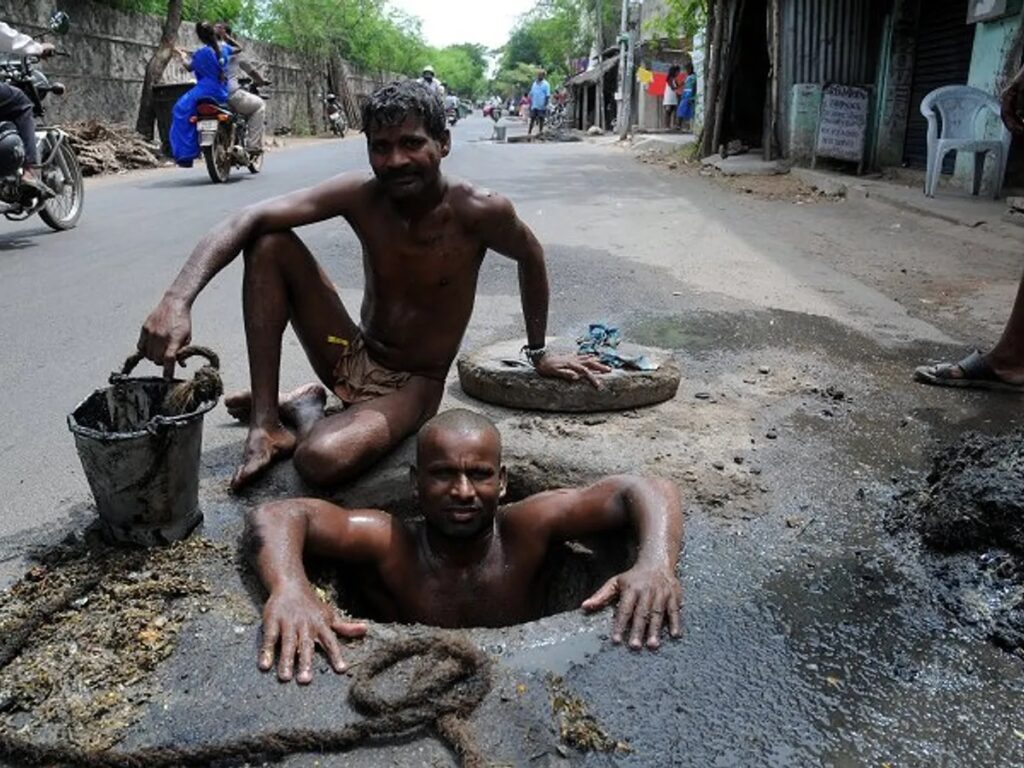NHRC Writes To States, Union Territories On Ending Manual Scavenging
May 16, 2025 | Pratirodh Bureau
The rights panel has asked authorities to submit an action taken report within eight weeks (Photo: BCCL)
The National Human Rights Commission (NHRC) has taken a significant step by urging all states and Union Territories to ensure the “immediate implementation” of directives issued by the Supreme Court in a landmark 2023 verdict. This ruling is focused on eradicating the inhumane practices of manual scavenging and hazardous sewer cleaning, which have long been a blight on human dignity and rights.
In a statement released on Thursday, May 15, the NHRC emphasized the need for “robust monitoring systems to ensure real-time compliance and deterrence.” This call to action comes in light of the persistent issues surrounding manual cleaning of hazardous waste, which the NHRC has described as a “grave violation of human rights.” The commission highlighted that such practices infringe upon the fundamental right to life with dignity and equality before the law.
The NHRC’s letter, addressed to all chief secretaries and administrators of states and Union Territories, specifically references the “14 directives issued by the Supreme Court in its landmark 2023 judgment (Dr. Balram Singh v/s Union of India, 2023 INSC 950).” These directives are aimed at eradicating the “inhuman and caste-based practice” of manual scavenging and hazardous sewer cleaning. The commission has made it clear that despite existing constitutional and legal safeguards, as well as a complete ban announced by the Supreme Court in January 2025 in six major cities—Delhi, Mumbai, Chennai, Kolkata, Bengaluru, and Hyderabad—reports of manual cleaning of hazardous waste continue to emerge from various parts of the country.
In light of these ongoing violations, the NHRC has recommended several immediate measures to be implemented by the authorities. One of the key recommendations is the “wide dissemination of the prohibition of manual scavenging and relevant judicial directives among stakeholders,” which includes local authorities, contractors, and the general public. The NHRC believes that raising awareness about these prohibitions is crucial for fostering a culture of compliance and respect for human rights.
Additionally, the NHRC has called for “sensitisation programmes for government officials, sanitation workers, and communities” to educate them on the legal, social, and human rights dimensions of manual scavenging. These programs aim to create a more informed and empathetic approach to the issue, ensuring that all parties understand the implications of manual scavenging and the importance of eradicating this practice.
Moreover, the NHRC has stressed the necessity of establishing “regular follow-ups and review mechanisms” to track progress, identify implementation gaps, and ensure accountability at all levels. This systematic approach is intended to create a framework for ongoing evaluation and improvement, ensuring that the directives are not only implemented but also effective in achieving their intended goals.
The NHRC’s proactive stance reflects a growing recognition of the need to address the deep-rooted issues associated with manual scavenging and hazardous sewer cleaning. By calling for immediate action and comprehensive measures, the NHRC aims to uphold the dignity and rights of those affected by these practices, reinforcing the principle that every individual deserves to live a life free from indignity and discrimination.
The NHRC’s efforts to eradicate manual scavenging and hazardous sewer cleaning are a crucial step towards ensuring human rights for all. The commission’s recommendations, if implemented effectively, have the potential to bring about significant change in the lives of many, fostering a society that values dignity, equality, and justice for every individual.
